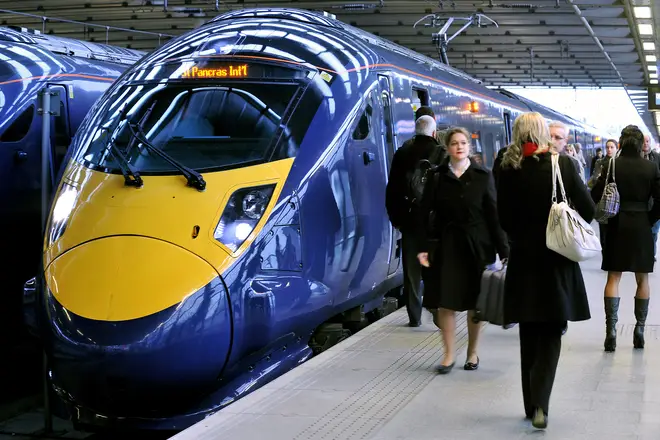
Lewis Goodall 10am - 12pm
20 May 2021, 07:05 | Updated: 21 May 2021, 06:11

Nick Ferrari grills Transport Secretary over rail reform plans
A new state-owned body will be set up as part of the biggest overhaul of the UK's rail network since privatisation in the mid-1990s.
The rail network will be rebranded Great British Railways (GBR) and shall see the creation of flexible season tickets for passengers from next month.
It will also effectively end the franchise system that has been in place for roughly a quarter of a century, however trains will still be run by private companies under new "passenger service contracts".
GBR will be responsible for controlling trains, tracks, timetables and stations as part of the sweeping reforms, the Department for Transport (DfT) said.
The new public sector body will also manage rail infrastructure, issue contracts to private firms to run trains, set most fares and sell tickets.
Network Rail will be subsumed to end the current "blame-game system" between train and track operations when disruption occurs.
Read more: 'Significant moment' as London's Crossrail tests trains on track
Read more: Major travel disruption on UK railways after cracks found on some trains

However, GBR, whose logo will be an updated version of British Rail's double arrow, will not be established until 2023, although many reforms will be introduced before then.
The plan is contained in a white paper and is based on recommendations from a review of the UK's railways carried out by former British Airways chief executive Keith Williams in light of the chaotic introduction of new timetables in May 2018.
It was initially due to be published in autumn 2019 but was delayed by the general election and the coronavirus pandemic.
Prime Minister Boris Johnson said: "I am a great believer in rail, but for too long passengers have not had the level of service they deserve.
"By creating Great British Railways, and investing in the future of the network, this Government will deliver a rail system the country can be proud of."
Watch: Shocking moment girl is knocked onto train tracks by gang of yobs
Rail fare rises 2021: Ticket prices hiked by 2.6 per cent despite low demand

Grant Shapps explains how rail investment will give larger projects a boost
The flexible season tickets, which will go on sale on 21 June for use seven days later, will offer people savings on certain routes if they only travel to work two or three times a week, with more companies allowing staff to work from home.
There will also be a "significant roll out" of more pay as you go, contactless and digital ticketing on smartphones, the Department for Transport (DfT) said.
Rail franchises were effectively ended when the government took over the financial liabilities of operators, at a cost of £10 billion, in March 2020 to keep services running amid the collapse in demand caused by Covid.
The emergency agreements will be replaced by passenger service contracts, with GBR contracting private firms to operate trains and with operators being incentivised to run high-quality services and increase passenger numbers.
This concession model is similar to the one used for London Overground and Docklands Light Railway services by Transport for London.

Transport Secretary Grant Shapps breaks down £794m rail investment
Transport Secretary Grant Shapps said Britain's railways were built to "forge stronger connections" and provide "an affordable, reliable and rapid service", but passengers have been failed by "years of fragmentation, confusion and over-complication".
"That complicated and broken system ends today," he added.
"Great British Railways marks a new era in the history of our railways.
"It will become a single familiar brand with a bold new vision for passengers - of punctual services, simpler tickets and a modern and green railway that meets the needs of the nation."
Mr Williams said: "Our Plan is built around the passenger, with new contracts which prioritise excellent performance and better services, better value fares, and creating clear leadership and real accountability when things go wrong."

Nick Ferrari grills Transport Secretary over 'smart motorways'
Anthony Smith, chief executive of passenger watchdog Transport Focus, said: "Passengers will welcome this move towards a more accountable and joined-up railway.
"Ultimately what they will care about is whether rail is the best option for them - if it is reliable, efficient and good value."
Manuel Cortes, general secretary of the Transport Salaried Staffs Association (TSSA), dismissed the plan as "papering over the cracks".
He said: "A concessions-based model will still see passengers' and taxpayer money leak out of our industry in the form of dividend payments for the greedy shareholders of the private operators who will hold them."